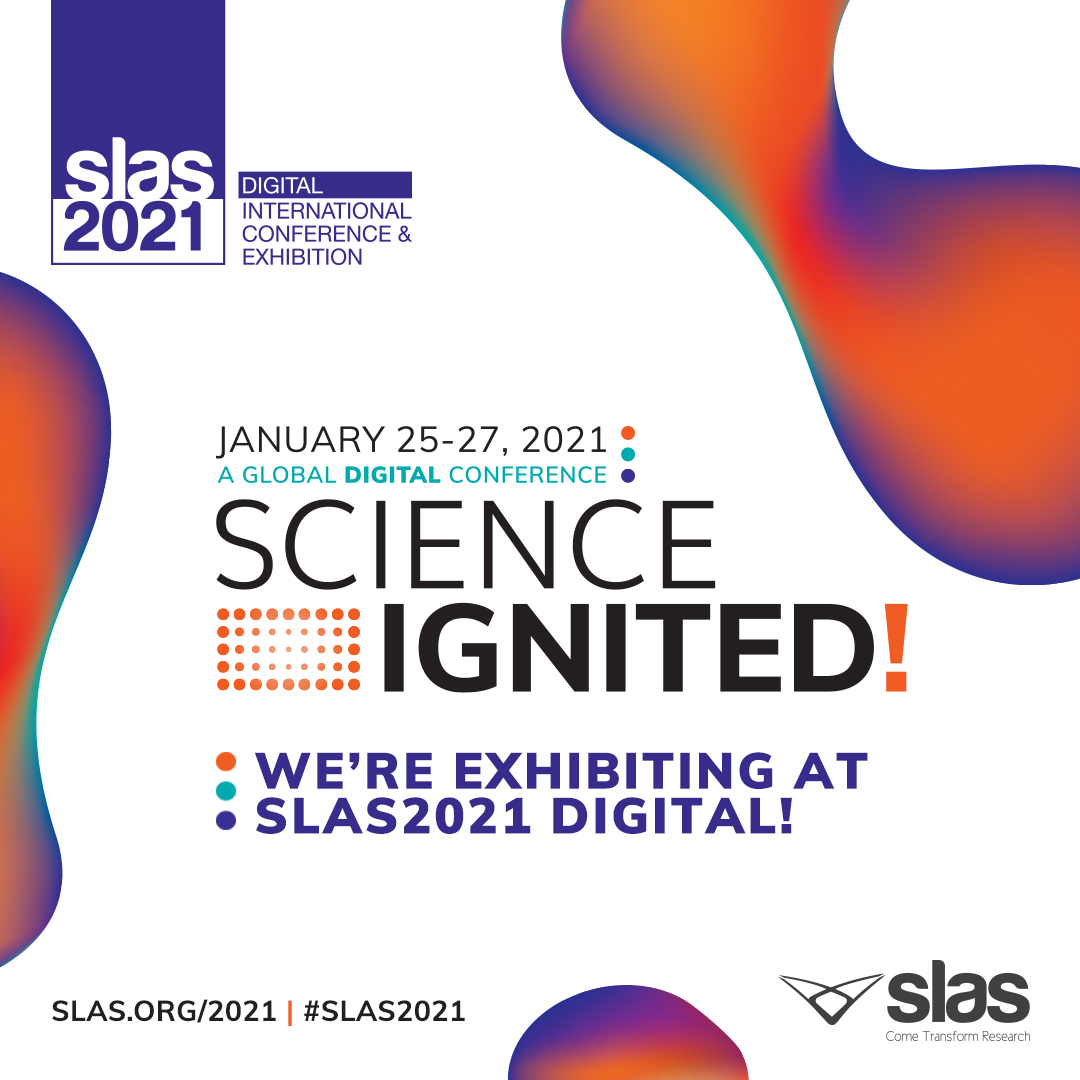The SLAS2021 Conference was a digital event which brought together thousands of scientists, engineers, academics, graduate students, post-docs and business leaders from academia, government and industry. During an information packed three days of the conference, attendees had access to 80+ dynamic scientific talks, 3 course workshops, 3 keynote and plenary presenters, exhibitor tutorials, virtually-enhanced networking and partnering opportunities, along with product/service information, content and education from over 200 exhibitors.
In this blog, we’ll discuss some of the highlights from this year’s SLAS Conference.
Monday, January 25th Highlights
The opening day of the conference began with a welcome from SLAS President Hansjoerg Haas who emphasized how the life sciences R&D community had to adapt to a completely new work environment in 2020 due to COVID-19. He added that the challenge of 2021 would be harmonization of the new data communication and the digital infrastructure that researchers are now living in.
This day provided a wealth of informative sessions, along with positive comments and strong Q&A from scientific session attendees. A few of our favorite presentations are described below.
Opening Keynote – Innovate Within: Challenging the Status Quo Through Intrapreneurship
In this inspiring opening Keynote, Deborah Slipetz, Ph.D., discussed the importance of fostering and enhancing innovation within life science organizations. As the Executive Director and Co-founder of the Imagine program, Dr. Slipetz works to democratize innovation within Merck & Co., Inc. as a key to driving value. She describes the Imagine program as “a safe, unapologetic space for Merck employees to effectively communicate and execute compelling ideas that drive change through collaborative design.”
According to a study by McKinsey, successful business transformations engage employees in every role as opposed to applying top-down strategies. With the cost of the drug development process continually increasing, and a 90% failure rate for experimental drugs that go into clinical trials, Dr. Slipetz emphasized that our industry needs to change the way we work, the way we think about innovation, and the way we listen to employees to bring innovation forward. She cited a study showing 47% of laboratory employees feel their innovation ideas are not being properly considered. The opportunity exists to harvest this internal innovation potential to bring fresh ideas and solutions to challenges big and small.
The Imagine program seeks to empower employees to raise their ideas, have them heard, and experiment more broadly. To achieve these goals, Dr. Slipetz and her team have implemented a variety of tools to arm employees with effective communication skills and the self-confidence to speak up and say “what if?” Taken from what has worked in the Imagine program, Dr. Slipetz shared the following simple strategies to democratize the innovation process:
- Respond to new ideas with “Yes, and…” rather than “But” or “We tried that…”
- Ask forgiveness rather than permission.
- Share the responsibility for innovation.
- Set a growth mindset — one that sees possibilities, not constraints.
- Embrace “intelligent” failure.
- Demand diversity and collaboration.
Science Ignited – Harnessing Synthetic Biology and Deep Learning to Fight Pathogens
In this fascinating presentation, James J. Collins, Ph.D., Termeer professor of medical engineering & science at MIT, discussed the new field of synthetic biology. Dr. Collins asserts that, along with artificial intelligence, synthetic biology will be one of the defining technologies of this century. Synthetic biology brings together engineers with molecular biologists to model, design and build synthetic gene circuits and other molecular components, which are then used to reprogram living cells by endowing them with novel functions.
In essence, synthetic biology allows scientists to produce programmable cells or living technology. Just a few areas where this technology is being explored include:
- to produce better crops in the agricultural industry
- to engineer plants to pull more carbon out of the atmosphere
- to create inexpensive means to identify toxins and pathogens in water
- to increase the heat tolerance of coral reefs to stop their bleaching
- to create solutions (e.g., biofuels) to address the energy challenges we face as a planet
The focus of this talk was about how synthetic biology is having impacts in biomedicine. A decade ago, Dr. Collins’ team was challenged by the Gates Foundation to engineer bacteria to serve as living diagnostics and therapeutics. His team had great initial success by engineering the Lactococcus lactis bacteria to serve as both a diagnostic and therapeutic for cholera.
Since then, various scientists have gone on to develop the ability to freeze dry engineered cellular extracts (e.g., mitochondria, DNA, nucleotides, ATP, etc.) onto paper and fabrics to create paper-based and wearable diagnostics (e.g., masks that reveal when you have been exposed to a particular pathogen like COVID-19) for a variety of pathogens. Dr. Collins also shared how the mRNA vaccines from Pfizer and Moderna both have synthetic biology origins.
Tuesday, January 26th Highlights
In addition to a wealth of scientific talks, Day 2 of the SLAS2021 Conference featured Innovation Award finalist presentations. This award honors research that proves to be exceedingly innovative and contributes to the exploration of technologies in the laboratory. This year’s finalists covered new ideas and experiments in chemistry, virus modeling, toxicity screening, microfluidics, COVID surveillance and more. We found Josh Gibson’s presentation on CellPreserve to be particularly interesting.
CellPreserve: A Platform to Enable Longitudinal Cell Studies
Current liquid biopsy techniques allow lysis or other destructive testing methods that can provide important insights into cell genomics and transcriptomics. Given the typical 24-hour lifetime of cells extracted with current techniques, however, time-dependent properties such as cell proteomics and metabolomics are not able to be tracked. In this presentation, physicist Josh Gibson of Cambridge Consultants discussed an innovative, scalable, commercially relevant apparatus and method (CellPreserve) that his team has developed for extending the lifetime of isolated rare cells to weeks, enabling longitudinal rare cell studies.
The CellPreserve platform uses the following process to extend cellular lifespan:
- Capture and then encapsulate a single cell in a microdroplet within the platform
- Utilize an electrowetting-on-dielectric (EWOD) system to move the microdroplet to an environmentally controlled storage region
- Utilize EWOD to divide the microdroplet in two
- Identify the empty half of the split microdroplet and extract the supernatant for analysis/disposal
- Replace the removed ‘half microdroplet’ with refreshed supernatant, thus extending the cell lifetime
- Repeat steps 2 – 5 at pre-determined intervals
By extending the lifespan of a cell through active control of its environment and nutrient supply, the CellPreserve platform opens up a range of new analysis techniques (e.g., time-based assessment of DNA release, cell phase monitoring, cytokine release and the longitudinal morphological analysis of cells through imaging) on rare cells in liquid biopsies to facilitate better targeted therapies for patients. The method also has applications in drug discovery and in-line QC for immunotherapy manufacturing.
Wednesday, January 27th Highlights
Featured Plenary: Scott Gottlieb, M.D., Former Commissioner, U.S. Food and Drug Administration
In this featured plenary talk, former commissioner of the U.S. Food and Drug Administration, Scott Gottlieb, M.D., discussed the strengths of the COVID vaccine development process, the threat of the new COVID variants, his vision for the future of drug discovery, and opportunities for collaboration across industry segments and companies to create and validate tools. His comments on a few of the questions he was asked are summarized below:
- Does the FDA work collaboratively with other agencies across the globe to harmonize regulations for drug approval? In recent years, the push to achieve global harmonization of regulatory standards for drugs has slowed down. This is primarily due to shifting regulatory mandates being placed on the different regulatory agencies around the world by elected officials, resulting in a reluctance to purse harmonization.
- Can you outline how we were successful in developing COVID-19 vaccines so rapidly? Time was saved primarily in two places – coming up with the vaccine construct and then bringing that construct into clinical trials. The vaccine construct was able to be developed quickly due to the successful application of synthetic biology techniques using the mRNA of the virus. Then, very little time was spent on optimization of the formulation, which allowed the vaccines to be brought into clinical trials quickly. It is important to note that no shortcuts were taken in determining the safety and efficacy of the vaccines. The clinical development part of the process was very intensive, with over 75,000 people total participating in full-blown outcome studies, making the clinical trials for the Pfizer and Moderna vaccines two of the largest in history for vaccine development.
- What have we learned from COVID vaccine development that could be applied to improve and/or speed development for other medicines? COVID validated the synthetic mRNA approach for vaccines, but this technology is also being applied to treatments to other diseases.
- Do you expect COVID vaccines will be developed every year to address new strains of the virus similar to the flu vaccine? We are already seeing new variants, a few of which have mutated parts of the virus spike protein that the most effective vaccine-induced antibodies are targeting. We will thus likely need to reformulate each year. Even if we don’t need to get revaccinated each year, we will probably go on a yearly schedule where people are getting vaccinated for COVID around the same time they are getting vaccinated for the flu. Like the flu, we will need an abbreviated regulatory process for COVID vaccine approval.
- What is your opinion on open science in drug discovery, and have your opinions changed as a result of the pandemic? There will always be an important role for precompetitive science, yet proprietary work within companies is important as well. That said, the mechanisms for sharing are not as robust as they could and should be. COVID has certainly stimulated improvement in some of these sharing mechanisms (e.g., correlating information around sequences with clinical data that can help us make determinations about how mutations in the virus are correlating with changes in behavior of the virus). Genomically-derived epidemiological investigations are an example where there has been very robust novel scientific sharing.
- Where do you think the growth areas are in the life science start up sector? Novel technologies around curative therapy, specifically cell and gene therapies. Right now these technologies are being applied to rare diseases, but over time they will likely move into more mainstream areas as safety profiles and efficacy improve and development costs are reduced. Tremendous opportunity exists in applying curative therapies to restore tissue function in things like diabetes and heart disease, for example.
Conclusion
The SLAS2021 Digital International Conference and Exhibition was a great success. This event continues to be an excellent venue for advancing life sciences research and knowledge exchange with peers. Kalleid looks forward to continuing to contribute to the conversation on how R&D IT support services can best enable the new era of curative therapies and precision medicine.



